Text
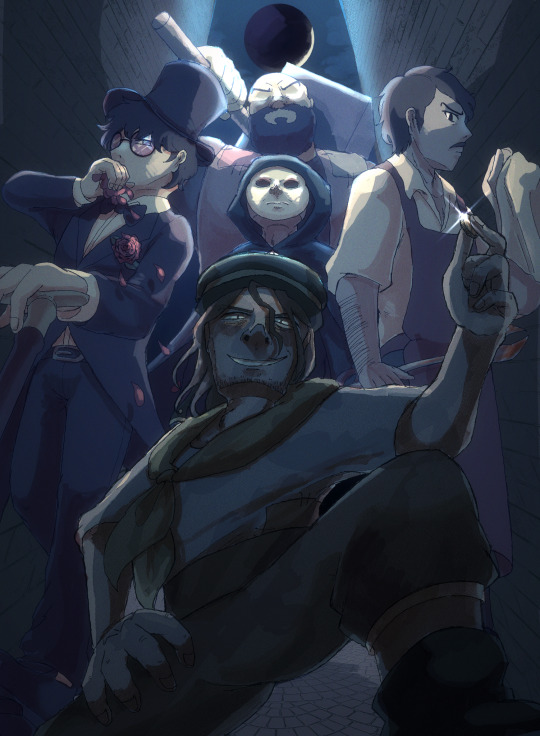
pov: you’re getting mugged
#op this is AMAZING! I love the stylisation of the piece :D#patron minette#patron-minette#montparnasse#babet#claquesous#gueulemer#thenardier#other people’s beautiful art#reblog
110 notes
·
View notes
Text

Ciarán Joyce as Montparnasse in Les Misérables (West End production), 2017
•
This former costume was just wonderful (the peacock-esque colour scheme is perfect!), I miss it dearly!
#montparnasse#les miserables#les mis musical#adaptations#I took the screenshot at the time from a vid on LM's Instagram stories but have since edited it lightly in an attempt to reduce motion blur#other photos of Ciaran in his Montparnasse costume show him wearing a much darker plum lip shade— but here it appears more subtle#Ciaran is also missing Montparnasse’s belt in this screenshot— these former costumes often included a belt fastened over the waistcoat#the current Montparnasse costume no longer features a top hat… and now includes a big scar drawn over the actor’s eye!
37 notes
·
View notes
Text
All credit to the wonderful @ferociousconscience for pointing me toward some fascinating background information and additional insights about Magnon in the cut chapter 'Further Adventures of M. Tholomyès' [source]!
This omitted section provides us with further context evidencing that, prior to her scheme involving the mômes in 1832, Magnon had been employing similar tactics and using children to manipulate circumstances to her advantage for many years. Interestingly, Hugo even draws parallels to real-life happenings of the time and briefly ties the character within a wider narrative: 'To those who would find such existences unbelievable, it suffices to respond that they are real.'

Not only do we gain newfound insight here into Magnon's deceitful past and personal affairs when she was 'hardy' and 'young', but this cut chapter also reveals just how long-standing her connection to the Thénardier family really is (a detail which is eluded to in the final novel, but never fully explained).
In fact, the focus of this chapter actually involves Magnon being lent Cosette by Monsieur and Madame Thénardier (for only 3 francs!) so that she can convince the municipal welfare office that she has a child. However, by coincidence, when making her way to the town hall with Cosette, Magnon stumbles upon the wedding ceremony of none other than Tholomyès… resulting in a heartbreaking incident where Cosette recognises her father and calls after him.
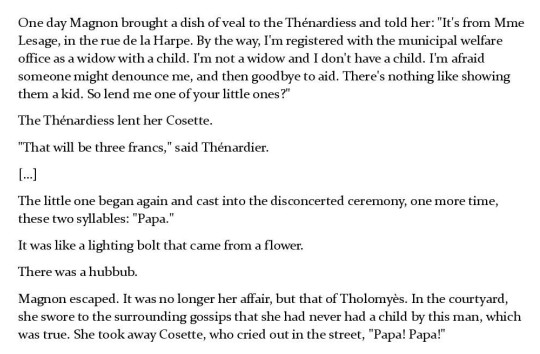
I love the deeper insight we get into Magnon's criminality and deceitfulness in these unpublished sections (which, in turn, also helps to emphasise the influence of gender and patriarchal ideals in shaping a perceived sphere of 'Women's Crime' during this period— where it was commonly assumed that women generally committed less violent but more exploitative crimes in comparison to men).
Moreover, I find this additional information about Magnon particularly interesting in light of the fact that, at one stage in the novel's drafting progress, she may have also been intended as Brujon's mother [more info here], originally being given the name La Brujon instead of La Magnon. I'm completely fascinated by the different avenues this character might have been taken if Hugo changed his mind before publication!
#magnon#les miserables#les mis#the brick#cut content#meta#the original manuscript#women and crime#historical context
45 notes
·
View notes
Text
So many choices… how do I pick a favourite!
I absolutely adore Babet’s mistress. She is locked up in La Salpetrière at the same time when Babet is in La Force prison, and he manages to smuggle her Brujon’s note about rue Plumet (which she then somehow smuggles to Magnon). We know nothing else about her really, but her apparent loyalty to Babet intrigues me greatly.
Additionally, I’m really fond of Panchaud! Although he only makes a brief appearance alongside the other members of Patron-Minette during the Gorbeau ambush, there is so much interesting information about this character that can be discovered through passing mentions. My favourite detail about the character is that he still engages in criminal activities even beyond the novel’s narrative, becoming a notorious name within La Force prison and leaving his mark on its walls during an infamous escape in 1848.
Brujon’s father (aka, the Brujon of 1811) is another favourite niche character of mine, even if we don’t really ‘see’ him in the novel, but rather only learn of him in passing.
Very important question that's totally unrelated to a fanfic I'm writing:
Who is your favorite extremely obscure Les Mis character? Like, the one that no one even knows exists because they've got like two lines in a thousand page novel?
#if I could include an honourable mention I’d pick Mamselle Miss!#good luck with your fic op!#les miserables#babet's mistress#panchaud#brujon 1811
159 notes
·
View notes
Text

He was on top of a wall ten inches wide, stretched out under the heavy rains, with two gulfs to right and left, unable to stir, subject to the giddiness of a possible fall, and to the horror of a certain arrest, and his thoughts, like the pendulum of a clock, swung from one of these ideas to the other: “Dead if I fall, caught if I stay.”
— Les Misérables, IV.VI.III
Illustrated by Adriano Minardi (Italian Edition, 1930)
22 notes
·
View notes
Text
Babet and Molutor in ‘Le Monde des Prisons’
There are many interesting references made to Les Misérables in Le Monde des Prisons (1887) by Georges Moreau. This relatively unknown work features the detailed recollections of Moreau’s own interactions and conversations with real prisoners (“reproduire mes conversations”) during his tenure as an ‘aumônier’ at La Grande-Roquette prison in Paris.
Throughout the account, Hugo’s writings on crime and criminal archetypes as featured in Les Misérables are frequently cited. This even extends to fleeting discussions about the police and prison system (click here for a rather intriguing comparison involving Javert).
However, there is a particularly notable chapter where a real-life criminal, identified only as Molutor, is compared extensively to the character of Babet:
“Victor Hugo a crayonné de main de maitre un joli quatuor de bandits, Claquesous Gueulemer, Babet et Montparnasse, qui, dit-il, gouvernaient, de 1830 à 1835, le troisième dessous de Paris, cette cave d'où sort Lacenàire. [...] Molutor (François-Joseph), le père de notre fugitif de la Petite-Roquette, avait été plus favorisé de la fortune que le Babet de Victor Hugo. Sa femme lui avait donné trois enfants qui, pour n'être pas nés avec un mufle de veau, lui avaient rapporté une petite aisance.”
[Trans. Victor Hugo has masterfully pencilled a lovely quartet of bandits, Claquesous, Gueulemer, Babet and Montparnasse, who, he says, ruled the third substage of Paris from 1830 to 1835, the cellar from which Lacenàire emerged. [...] Molutor (François-Joseph), the father of our Petite-Roquette fugitive, had been more fortunate than Victor Hugo's Babet. His wife had given him three children who, though not being born with a calf's muzzle, had brought him a small amount of wealth.]
•
I find these comparisons truly captivating, as— despite initially seeming rather trivial— allusions such as this uniquely blend real-life criminality with fictional realms.
Moreau goes on to elaborate that Molutor and the character of Babet share additional similarities because they both extend their criminal activities into theatrical spheres; Babet’s vaudeville performances and his displaying of ‘freaks’ are indirectly compared to Molutor’s activities as innkeeper of a real club named Le cabaret des Pieds. In an even more intriguing detail, Moreau describes Molutor as occasionally collaborating with a brute named ‘Gueule-de-Sac’— which makes me think of ‘Gueulemer’!
Moreover, even the physical attributes of Babet and Molutor are paralleled… echoing a disconcerting, though unfortunately unsurprising, ideology (whether on purpose or implicitly) wherein certain physical traits were believed to correspond with particular criminal behaviours.
“Ce Molutor était un homme petit, maigre, blême, anguleux, osseux, chétif, qui avait l'air malade et qui se portait à merveille; sa fourberie commençait là. Il souriait habituellement par précaution, et était poli à peu près avec tout le monde, même avec le mendiant auquel il refusait un liard. Il avait le regard d'une fouine. S'il rappelait Babet par certains côtés il faisait encore plus songer à Thénardier. Comme Thénardier, il s'était établi gargotier à Alger. / Souvent, il s'absentait plusieurs semaines de suite et l'on remarquait que c'était toujours du côté et à l'époque où nos soldats se battaient contre les Arabes. Il partait avec une petite carriole attelée d'un mauvais cheval, emportant quelques provisions qu'il vendait fort cher aux troupes.”
[Trans. “This Molutor was a short, skinny, pallid, angular, bony, puny man, who looked ill and was doing wonderfully well; his deceitfulness began there. He usually smiled as a precaution, and was polite to just about everyone, even the beggar to whom he refused a liard. He had the look of a weasel. If he reminded us of Babet in some ways, he reminded us even more of Thénardier. Like Thénardier, he had established himself as a gargotier in Algiers. / He was often away for several weeks at a time, always on the side and at the time when our soldiers were fighting the Arabs. He would leave with a small cart hitched to a bad horse, carrying a few provisions which he sold at a high price to the troops.”]
•
The line “Il souriait habituellement par précaution, et était poli à peu près avec tout le monde, même avec le mendiant auquel il refusait un liard” instantly brings to mind Boulatruelle’s introduction in Les Misérables:
“Ce Boulatruelle était un homme vu de travers par les gens de l'endroit, trop respectueux, trop humble, prompt à ôter son bonnet à tout le monde, tremblant et souriant devant les gendarmes, probablement affilié à des bandes, disait-on, suspect d'embuscade au coin des taillis à la nuit tombante.” — Book II.II.II
#babet#thenardier#boulatruelle#patron minette#patron-minette#les miserables#les mis#the brick#meta#historical threads#le monde des prisons
17 notes
·
View notes
Text
“Now, now, children,” said Thénardier, “we’re losing time. The flatfeet are at our heels.”
“Well, then,” said one of the thugs, “let’s draw lots to see who goes first.”
Thénardier exploded: “You’re mad! You’re insane! What a pack of mugs! You want to lose time? Why don’t we draw lots while we’re at it? Shall we use a wet finger! Or the short straw! Write our names down! Put ‘em in a hat!—”
“Would you like my hat?” cried a voice from the door.
Everyone wheeled round. It was Javert.
He had his hat in his hand and held it out, smiling.

for Gorbeau Ambush day, please accept this wonky gif
#gorbeau ambush anniversary#february 3rd 1832#javert#thenardier#patron minette#patron-minette#adaptations#quotes
60 notes
·
View notes
Text
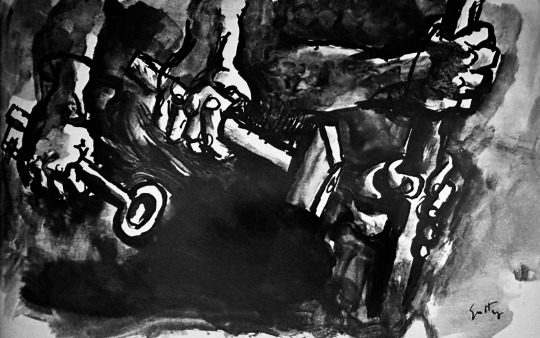
“The door of the garret had just swung open abruptly and revealed three men in blue canvas smocks wearing masks of black paper. The first was skinny and had a long cudgel with an iron tip, the second was a sort of colossus, carrying a pole-axe for slaughtering cattle, holding it by the middle of the handle with the hatchet part pointing downward. The third, a man with big broad shoulders, was bigger than the first but not as massive as the second, and he was holding an enormous key stolen from some prison or other in his clenched fist.
It looked as if it was the arrival of these men that Jondrette had been waiting for.”
•
Happy 192 years to the failed Gorbeau ambush!
#gorbeau ambush anniversary#february 3rd 1832#patron minette#patron-minette#les miserables#les mis#illustrations#quotes#patron minette affiliates#gorbeau ambush
17 notes
·
View notes
Text
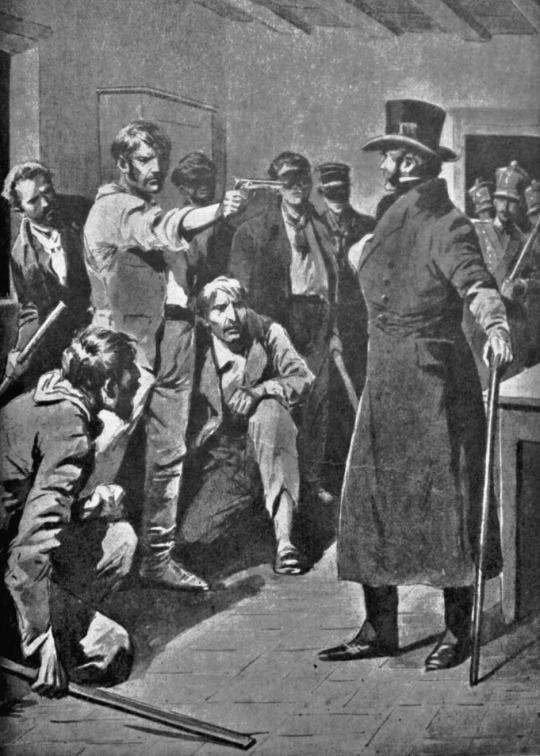
‘Thénardier prit le pistolet, et ajusta Javert.
Javert, qui était à trois pas, le regarda fixement et se contenta de dire:
“Ne tire pas, va! ton coup va rater.”
Thénardier pressa la détente. Le coup rata.
“Quand je te le disais!” fit Javert’
[Source]
#patron minette#patron-minette#javert#thenardier#les miserables#les mis#illustrations#quotes#gorbeau ambush
81 notes
·
View notes
Text

The scion
Brujon sketches
21 notes
·
View notes
Text

the pensives
@patron-minette thank you for your massive brain
#oh my goodness op this is AMAZING!#brujon x azelma#I cannot believe other people can get behind this (extremely) rare pair!!#it makes me so happy!!#brujon#azelma#other people’s beautiful art
26 notes
·
View notes
Text
“Brujon, Gueulemer et Montparnasse fraternisent avec Gavroche, qui est le fils de Thénardier, et qui, à son tour, fraternise avec Courfeyrac, Combeferre et Bossuet. Il en résulte un singulier effet d’optique et de mirage, une confusion désobligeante entre ces deux groupes si distincts. Le lecteur distrait, préoccupé du voisinage de ce jeune fils de famille, de ce digne garçon de tant d’espérance et de tant d’argot, qui casse si gentiment les réverbères, tire la langue aux mandements de l’arche vêque et se bat héroïquement pour la patrie, le lecteur, disons-nous; se demande parfois où commence le Brujon et où finit le Courfeyrac.”
— Le Correspondant (1862) [Source]
[Trans. Brujon, Gueulemer and Montparnasse fraternise with Gavroche, who is the son of Thénardier, and who, in turn, fraternises with Courfeyrac, Combeferre and Bossuet. The result is a singular optical and mirage effect, a disparaging confusion between these two very distinct groups. The distracted reader, preoccupied with the neighborhood of this young son of a family, this worthy boy of so much hope and so much slang, who so nicely breaks the street lamps, sticks out his tongue at the commands of the archbishop and fights heroically for the fatherland, the reader, we say; sometimes wonders where Brujon begins and Courfeyrac ends.]
15 notes
·
View notes
Text
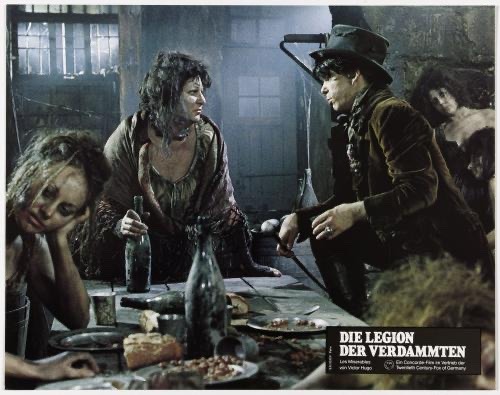
Montparnasse and Magnon in Les Misérables (1982) [Source]
Please note that the archive source incorrectly labels the characters in this still as La Thénardier and Gavroche, which makes me giggle.
#montparnasse#magnon#love the presence of Magnon— and her unique role— in this particular adaptation!#I’ve (unofficially) decided that the two other women in this picture are Fauntleroy and Les-pieds-en-l’air respectively#les miserables#les mis#lm 1982#adaptations
25 notes
·
View notes
Text
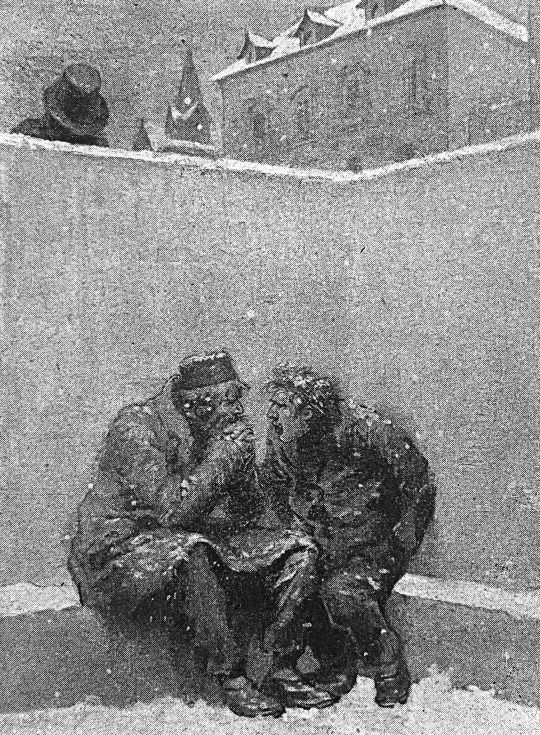

There, in fact, sat two men, flat on the snow, with their backs against the wall, talking together in subdued tones.
These two persons were strangers to him; one was a bearded man in a blouse, and the other a long-haired individual in rags. The bearded man had on a fez, the other’s head was bare, and the snow had lodged in his hair.
By thrusting his head over the wall, Marius could hear their remarks.
— Les Misérables, III.VIII.XIII
Illustrated by Carlo Chiostri (Italian Edition, 1930)
#brujon#demi-liard#my two favourite affiliates!!#I relish in every opportunity to see Demi-liard illustrated! I adore him!#Brujon’s stunned look— perfection!#illustrations
43 notes
·
View notes
Text
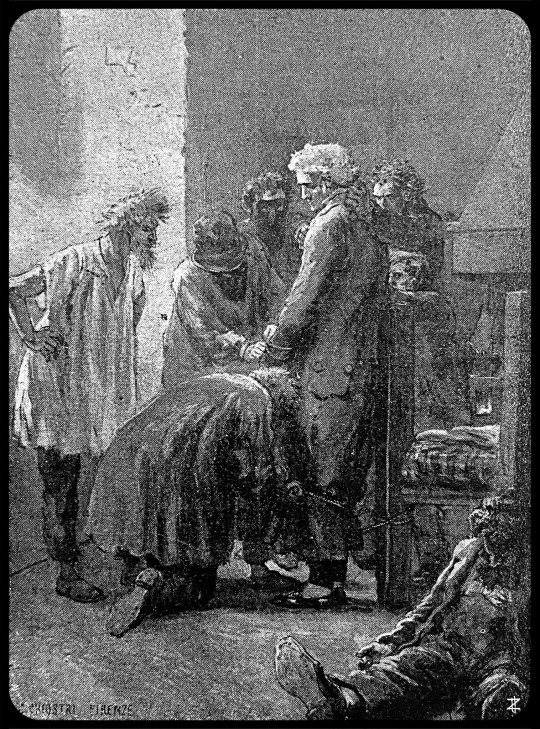
The pallet on which M. Leblanc had been thrown was a sort of hospital bed, elevated on four coarse wooden legs, roughly hewn.
M. Leblanc let them take their own course.
The ruffians bound him securely, in an upright attitude, with his feet on the ground at the head of the bed, the end which was most remote from the window, and nearest to the fireplace.
— Les Misérables, III.VIII.XX
Illustrated by Carlo Chiostri (Italian Edition, 1930)

Boulatruelle was so helpful..
#patron minette#patron minette affiliates#gorbeau ambush#illustrations#I LOVE getting to see Boulatruelle in these illustrations!!
41 notes
·
View notes
Text
#ooh the PAIN of choosing#I may be Demi-Liard’s no. 1 fan… but Babet’s mistress owns my heart#so alas Demi-Liard does not get my vote this time#mamselle miss is also CRIMINALLY underrated (excuse the pun) I wish we knew more about her
82 notes
·
View notes
Note
Babet 12, 14, 25, please. Thank you in advance!
Ah, hello!! It is so exciting to receive an ask from you, I see your wonderful LM Letters posts on my dash all the time, they're always amazing!
12. What's a headcanon you have for this character?
I have a set of interlinked headcanons all revolving around Babet and his dubious work as a quack dentist. These include Babet being the one who extracted Fantine's teeth, and him also pulling the teeth that Éponine is missing in the novel (I can imagine Thénardier would gladly exchange a couple of his daughter's teeth for a few coins). Babet might also extract the teeth of Patron-Minette's victims, and certainly would've plucked teeth from the corpses left behind after the failed uprising. Using these teeth, Babet then crafts and sells false sets... perhaps he even wears a set himself— made entirely from the teeth of his victims *shudder*.
14. Assign a fashion aesthetic to this character.
This is such an interesting question! While I'm not particularly knowledgeable when it comes to fashion aesthetics, I imagine Babet being the sort of person with a "Hollow Businessman" fashion sense, if he had the opportunity to play with his style. What I mean by this is that I see Babet to be the type to meticulously put together an outfit that appears pristine, clean, almost clinical in appearance— all with the intent of presenting himself as reputable and trustworthy to others. However, his empty eyes would always betray his true nature.
25. What was your first impression of this character? How about now?
Ooh, I think over time I have actually become increasingly unsettled by Babet's character! On my first read of the novel I glossed over a lot of the sinister details about Babet's previous occupations and never really thought about how he could so easily lose his wife and children as one does a handkerchief... but with each re-read I find a new detail about him which makes me shudder! Specifically, I've become more and more unsettled by how little we know about Babet's criminal history; we're explicitly told that Montparnasse has killed people, it's strongly hinted that Gueulemer was involved in Marshal Brune's assassination, and we even 'witness' Claquesous shoot the porter at the barricades as Le Cabuc— Yet, we never find out if Babet has ever committed murder. It can only be assumed that he has, but I find it unusually chilling that we are never told.
[Ask Game]
#ask game#thank you so much for the questions!#Babet really intrigues me I love being able to talk about him!
12 notes
·
View notes